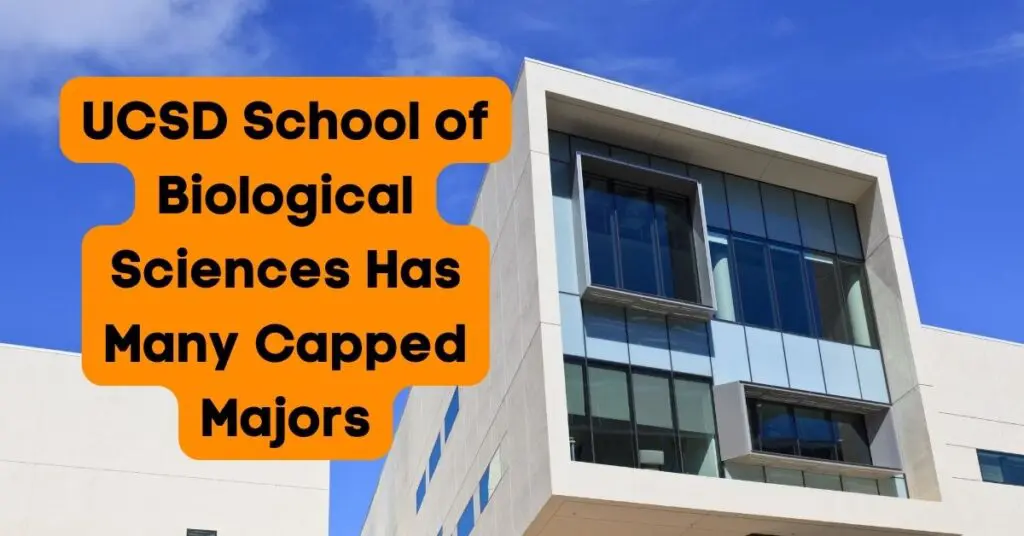If you’re interested in a capped major at UCSD, you’ll want to read this blog post. Here we’ll discuss the capped majors at UCSD and what it takes to get into them.
We’ll also provide tips on increasing your chances of being admitted into one of these majors. So, if you’re interested in a capped major, be sure to keep reading!
What is a Capped Major?
A capped major is a major at UCSD that has a limit on the number of students who can be admitted into the program. This means that not everyone who applies to the major will be admitted.
The admissions process for a capped major is more competitive than for an open major, and students will need to have strong grades and test scores to be competitive enough for admission.
Why Would a School Have a Capped Major?
Schools have Capped Majors for several different reasons. Still, majors are capped primarily because the institution does not have the resources or facilities to accommodate the number of students who declared the major to begin with.
As such, UCSD Capped Majors are a necessary component of the UCSD environment as UCSD Capped Majors ensure that students who are enrolled in the program are receiving enough resources (professors, classrooms, books). It also allows the School to keep class sizes small, which can lead to a better learning experience for all students.
Related Reading: UC
What Majors are Capped at UCSD?
The Following are the Capped Majors at UCSD (For All Students):
Capped Majors UCSD
Acceptance Rate (%)
Biological Sciences
17%
Data Science
14%
Physics
21%
Public Health
32%
Jacobs School of Engineering – all majors in these departments:
12%
Bioengineering
27%
Chemical Engineering
28%
Computer Science and Engineering
16%
Electrical and Computer Engineering
30%
Mechanical and Aerospace Engineering
24%
NanoEngineering
18%
Structural Engineering
29%
Biological Sciences, Data Science, Physics, Public Health, Jacobs School of Engineering, Bioengineering, Chemical Engineering, Computer, Science and Engineering, Electrical and Computer Engineering, Mechanical and Aerospace Engineering. NanoEngineering, Structural Engineering
Other impacted or capped majors at UCSD include those that are within the School or Department listed above. Your preferred major is the most important part of your transfer plan. If you know what you want to major in you can unleash all of the info for direct admission, curriculum requirements,
For example, UCSD is well known for its Biological Sciences curriculum, so it is no wonder the majors associated with that department (i.e., Biochemistry, Chemistry, Biology, etc) are highly sought after and subsequently capped.
Other Popular Majors at UCSD
Anthropology
Biology
Chemistry and Biochemistry
Cognitive Science
Communication
Economics
Mathematics
Philosophy
Physics
Political Science
Psychology
Sociology
How Many Students Apply to Capped Majors Each Year?
The number of students who apply to UC San Diego capped majors varies each year. For example, in 2019, 900 transfer students applied to the capped major of Biology. Of those students, 237 were admitted (26.33%). This means that not every student who applies to a capped major will be admitted into the program and even if they are accepted they may decide to become enrolled students at another institution.
Alternatives to UCSD Capped Majors
Thankfully the University of California at San Diego (UCSD) has not only identified the Capped Majors at UCSD, but the institution provided supplementary or UCSD alternate major choices for students who selected a capped major at UCSD.
Biological Sciences
Anthropology: Biological Anthropology • Chemistry: Biochemistry • Cognitive and Behavioral Neuroscience • Cognitive Science with a Specialization in Neuroscience • Environmental Systems: Ecology, Behavior, and Evolution • Global Health • Human Development Sciences • Marine Biology • Psychology with a Specialization in Clinical Psychology • Psychology with a Specialization in Human Health

Capped Majors at UCSD Start with the UCSD School of Biological Sciences
Data Science
Cognitive Science with a Specialization in Design and Interaction • Cognitive Science with a Specialization in Machine Learning and Neural Computation • Interdisciplinary Computing and the Arts
What is Data Science?
Data Science expands on existing models and methods in information, statistics, and computation, emphasizing the importance of data sources and their impact on data nature and quality. The practical application of digital data in everyday life, along with the demand for collaborative, cross-disciplinary, and scalable real-world solutions, has highlighted the need for a scientific and technological framework to comprehend and leverage data.
UCSD data science acceptance rate: Unknown
Enrolled Students: 714
Out of all the UC campuses, UC San Diego has a prominent and well-respected data science program. The Halıcıoğlu Data Science Institute – UC San Diego
Jacobs School of Engineering
Chemistry: Environmental Chemistry • Chemistry: Molecular Synthesis • Cognitive Science with a Specialization in Design and Interaction • Cognitive Science with a Specialization in Machine Learning and Neural Computation • Interdisciplinary Computing and the Arts • Mathematics: Applied Science • Mathematics: Computer Science • Oceanic and Atmospheric Sciences
Physics
Chemistry: Environmental Chemistry • Environmental Systems: Earth Sciences • Oceanic and Atmospheric Sciences
Public Health
Global Health • Human Development Sciences • Political Science: Public Policy • Psychology with a Specialization in Human Health • Sociology with a Concentration in Science and Medicine
Capped Major vs. Pre-Major Status
Many students tend to get Capped Major and Pre-Major Status mixed up. It is important to know what differentiates the two concepts and why they are important in transferring from a community college to a university.
6 Impacted Majors at UCLA you Should Know About | 2023
Capped Major
A capped major is not the same as a major requiring pre-major status. Capped majors simply refer to the inability to accommodate the number of applications with the available number of seats. This is likely caused for a number of reasons, all of which remain in the popularity of the course and major offering.
UCSD is a world-renowned research and biological sciences university, and it is thus a place where Biological Sciences learning folks would like to apply.
A pre-major status designation typically refers to UCSD Freshman or UC freshman not having completed the necessary coursework to apply for a major.
Recommended Reading: 11 Impacted Majors at UC Berkeley | 2022-2023 Admit Rates & Average GPA
Pre-Major Status
When you think of pre-major status designation, it is important to remember that pre-major status can be seen as a probationary test by the institution to see if you have what it takes to complete the degree requirements for a specific major.
Before declaring that as your major, pre-major classes are necessary to determine if you will excel in a specific area of study. The student is required to take these courses beforehand so the school can evaluate their potential. Not every university has this same requirement for students.
Frequently Asked Questions (FAQ) | Capped Majors at UCSD
How Do You Get Into Capped Major at UCSD?
If you submit an application to UCSD via the UCSD Application Portal, you will have to watch whether your major is considered ‘capped.’ You can submit a Capped Major at UCSD Application, but it will vary depending on the major you declare and how impacted it is. Moreover, you should speak with the admission representatives at UCSD or any other UC you are interested in because they will have all the information regarding major requirements and timelines.
Can I Apply to UC San Diego Without Declaring a Major?
First-Year students may be admitted to UC San Diego as undeclared. Transfer students, however, must be admitted into a major and may not apply as undeclared. If you’re a transfer student interested in specific majors, visit the Transfer Major Preparation page for detailed information on the preparatory coursework required to be considered for admission into that particular major.
If you need help choosing a major, speak with an academic counselor to assist you in selecting a major that matches your interests.
When Are The Capped Major Application and Filing Deadlines?
Some capped major departments do not have a separate interface. Still, the UCSD Biological Sciences department has a specific “Capped Major Application” that has all of the application and filing deadlines.
Do Transfer Students Have to Reassess Majors if they Chose A Capped Major?
Transfer students are in a different camp than Freshman UC applicants. To explain, I will use an example of a transfer student who was accepted to UC San Diego as a non-biology major.
John was happy to receive an admissions offer from his top UC, the University of California at San Diego (UCSD). Although John wanted to declare as a biology major, he was not going to be able to transfer in two years because he had to take Chem 6A, and Chem 6B as requirements for major preparation under the UCSD Biochemistry Major.
However, John thought he was going to be able to get away with changing his major once he successfully arrived at UCSD, but he was about to receive a rude awakening.
Conclusion
If you want to learn more about capped majors at UCSD, or any other university, be sure to check out our website for more information. We can help you understand the difference between a capped major and a pre-major and how to choose the right path for you. Visit us today!
There you have it! The Capped Majors at UCSD include Biological Sciences, Physics, Public Health, Computer Science, Engineering, and so much more. We examined the purpose and nature of capped majors as well as how it differs from pre-major status. With this new information, go out and explore the world of academia!





